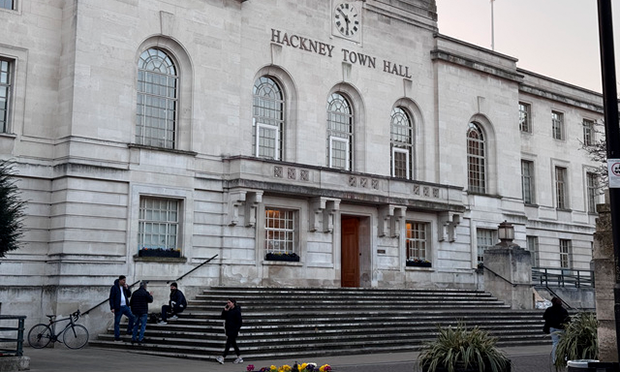Town Hall to consult on changing ‘generous’ social care charges

Hackney Town Hall. Photograph: Josef Steen / free for use by LDRS partners
Hackney Council is to consult on changing its “generous” social care package with the aim of bringing down its multimillion-pound budget overspend.
On Monday, cabinet members agreed to ask the public for feedback later this year on new proposals to raise charges for care support services, alongside other policy changes.
Health and social care chief Cllr Chris Kennedy said Hackney’s current system was an “outlier and an anomaly” compared to other councils and had led to local taxpayers “subsidising care for wealthier residents”.
The plans come as the local authority seeks to manage the growing costs of an ageing population, a rise in disability and long-term health conditions, and the need to deliver “personalised, dignified care” for residents.
The council’s report added that Hackney’s current charges used a “particularly generous financial calculation” and had not been reviewed for several years.
The Town Hall is proposing to remove its weekly cap of £250 on care charges, so wealthier residents may pay more if their care is more expensive.
It is also seeking to increase current charges from 92 per cent to 100 per cent to cover the full cost of care services, while also assessing residents’ entire income rather than the current limit of 75 per cent.
The council also plans to “consider” reducing the amount of disability benefits it excludes from assessments of residents’ income when calculating charges.
If approved, the total amount disregarded would fall from 25 per cent to 20 per cent.
Cllr Kennedy said less than two per cent of Hackney adults’ needs were serious enough that the council was legally obliged to support them.
Under the plans, the “poorest and most vulnerable” majority (60 per cent) of these people would still not pay “absolutely anything”.
“Let’s be absolutely clear: it is our wealthier residents, and the 40 per cent who are eligible, who are affected.
“The proposal here is based on equity – on being as fair as we can,” he said.
Cllr Kennedy added that the changes would have been brought in sooner if it were not for the pandemic and the 2020 cyber attack on the council’s systems.
“If I owe an apology to our residents, it is for that,” he said.
He was challenged by Independent Socialist councillor Penny Wrout, who raised concerns that the draft consultation relied on “loose general examples” that did not spell out precisely how the changes would affect people.
It was also “likely to spread alarm among vulnerable residents”, she said, including for disabled people who were “already anxious” about changes to Personal Independence Payments (PIP).
Cllr Wrout added: “The consultation is not designed to impact or to alter the changes to charges being decided today, so what is the point?
“No good can come of it.”
The health chief replied that consultation “always alarms and worries people”, but the council was trying to make the draft consultation “as clear as possible”.
“Everyone’s assets and income are different,” he said, adding that the council’s teams had chosen six of the “best examples out there” to give people an idea of how the changes would affect them.
Hackney Council faces a £51 million budget gap over the next three years, a major driver of which comes from adult social care.
According to the council’s most recent budget, demand for home care services had risen by 73 per cent since 2019/20.
During this time, the borough also saw a 40 per cent “surge” in the total number of people receiving care and assistance.
Commissioned services have also seen “escalating complexity”, the council’s report stated.
The government’s decision to hike employers’ National Insurance in the autumn budget could also add more pressure on Hackney if the local authority has to fund the increase, the council added.
The Care Act 2014 overhauled social care in England by changing how local authorities charge residents for support services.
It meant councils had to means-test how much people could afford to pay for their care, based on residents’ finances.
The Act also introduced new eligibility thresholds that categorised people with savings or assets over £23,250 as “self-funders”, meaning they were required to pay the full cost of social care.
Those with capital between £14,250 and £23,250 would receive some support, while those with less than £14,250 did not contribute anything from their assets.
The legislation also brought in the Minimum Income Guarantee (MIG), designed to ensure individuals cared for outside their home were left with enough money for basic living costs after they paid their charges.
Hackney’s new care policy is set to go out to consultation between July and September this year.
Update: this article was amended at 1.40pm on 22 May 2025. The consultation is expected to run from July to September this year, rather than April to June next year as originally stated.

Cllr Kennedy is introducing the means test into the NHS, let the residents look at this and kick this tory council out.